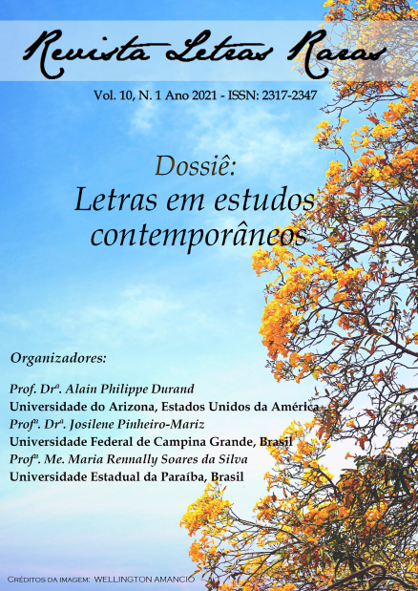Through the hands of the Lords of Campo Seco: source for studying the history of penetration and propagation of the written language in the highlands of Bahia
DOI:
https://doi.org/10.5281/zenodo.10278117Palavras-chave:
Brazilian portuguese, Farm book, Graph-phonetic indexes, 18th and 19th centuriesResumo
This article aims to present the linguistic study of a private manuscript, the Livro do Gado do Brejo do Campo Seco, written by a Lusitanian and his Brazilian descendants, in the Sertão da Bahia, between the ends of the colonial period in the middle of the times post-colonial. It is a relevant linguistic testimony for the studies of the social and linguistic reconstruction of Brazilian Portuguese, especially for the history of the penetration and diffusion of writing in the interior of Bahia. Thus, we sought to investigate the graphic aspects of the writers of this manuscript, investigating, from a qualitative perspective, the issue of disability / skill and the description of possible graph-phonetic indexes. For this study, Marquilhas (2000); Barbosa (1999, 2017). Regarding the results, it was found that the three authors of the Livro do Gado are not very skilled with written practice. In relation to the survey of graphical-phonetic indices, some occurrences, derived from the notes of Brazilians, appear to be aspects of lowering vowels; diphthong reduction; nasalization; vowel elevation. As for the graphic features, they identified aspects such as: graphics; latinization; grapheme replacement; grapheme elimination; inversion of grapheme order, spelling for nasal diphthong and vowel variation. This investigation collaborates with the third research agenda of PHPB, carrying out the linguistic study of the referred material, thus contributing with a significant corpus so that it is possible to reconstruct the past of Brazilian Portuguese (PB).
Downloads
Referências
BARBOSA, A. G. O controle de marcas de inabilidade na escrita alfabética e a identificação das mãos inábeis em corpora histórico-diacrônicos. Revista ABRALIN, v. 16, n. 2, p. 19-43, jan.-abr. 2017.
BARBOSA, A. G. Para uma história do português colonial: aspectos linguísticos em cartas do comércio.1999. 484f. Tese (Doutorado em Letras Vernáculas) Universidade Federal do Rio de Janeiro, Rio de Janeiro.
CARNEIRO, Z. de O. N. (Coord.). PROJETO Vozes do Sertão em dados: história, povos e formação do português brasileiro. Disponível em: [www.uefs.br/nelp].
CARNEIRO, Z. de O. N.; OLIVEIRA, M. F. de. (Coords.). PROJETO CE-DOHS: Corpus eletrônico de documentos históricos do sertão. Disponível em: [www.uefs.br/cedohs].
CARNEIRO, Z. de O. N.; ALMEIDA, N. L. F. de. A criação de escolas a partir de critérios demográficos na Bahia do século XIX: uma viagem ao interior. In: LOBO, Tânia; RIBEIRO, Ilza; CARNEIRO, Z.de O. N.(Org.). Para a História do Português Brasileiro: novos dados, novas análises. Salvador: EDUFBA, 2006. v. 2. p. 649-673.
LOBO, T. C. F. Arquivos, acervos e a reconstrução histórica do português brasileiro. In: OLIVEIRA, K.; CUNHA E SOUZA, H. F.; SOLEDADE, J. (Orgs.). Do português arcaico ao português brasileiro: outras histórias. Salvador: EDUFBA, 2009.
MARQUILHAS, R. A faculdade das Letras: leitura e escrita em Portugal no séc. XVII. Lisboa: Impressa Nacional-Casa da Moeda, 2000.
MATTOS E SILVA, R. V. Ensaios para uma sócio-história do português brasileiro. São Paulo: Parábola Editorial, 2004.
MATTOS E SILVA, R. V. Para a história do português culto e popular brasileiro: sugestões para uma pesquisa. Caderno das Letras da UFF – Dossiê: Literatura, Língua e Identidade, n. 34, p. 11-30, 2008.
OLIVEIRA, K. Negros e escrita na Bahia do século XIX: sócio-história, edição filológica de documentos e estudo lingüístico. 2006. 1198 f. Tese (Doutorado em Letras e Linguística) Universidade Federal da Bahia, Instituto de Letras, Salvador.
SANTOS, E. B. O Livro do Gado do Brejo do Campo Seco (Bahia): Edição Semidiplomática e Descrição de Índices grafo-fonéticos. 2019. 316f. Dissertação. (Mestrado em Estudos Linguísticos) Universidade Estadual de Feira de Santana, Feira de Santana.
SANTIAGO, H. S. Um estudo do português popular brasileiro em cartas pessoais de mãos “cândidas” do sertão baiano. 2012. 423.f. Dissertação (Mestrado em Linguística) Universidade Estadual de Feira de Santana, Feira de Santana.
SANTOS FILHO, L. Uma comunidade rural do Brasil antigo: aspectos da vida patriarcal no Sertão da Bahia, nos séculos XVIII e XIX. Ed. fac-similar, comemorativa aos 55 anos da primeira edição. Salvador: UEFS: Fundação Pedro Calmon, 2012.
SOUZA, L. C. Conflito de Família e Banditismo Rural na Primeira Metade do Século XIX: Canguçús e “Peitos Largos” contra Castros e Mouras nos Sertões da Bahia. 2014. 131 f. Dissertação (Mestrado em História) Universidade Federal da Bahia, Salvador.
Downloads
Publicado
Como Citar
Edição
Seção
Licença
Copyright (c) 2023 Revista Letras Raras

Este trabalho está licenciado sob uma licença Creative Commons Attribution-NonCommercial 4.0 International License.







